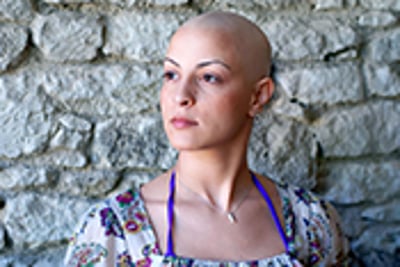FORCE's eXamining the Relevance of Articles for You (XRAY) program looks behind the headlines of cancer news to help you understand what the research means for you.
XRAY is a reliable source of hereditary cancer research-related news and information.
Learn more about the XRAY program
Relevant for: People with triple negative breast cancer, In portal: Breast Cancer
Article : FDA busts myths of preventing and treating cancer by eating apricot kernels, herbs, and other ingredients
Most relevant for: People diagnosed with or concerned about their risk for cancer
Maggie Fox (NBC News) writes about a new FDA report that warns of 14 "fraudulent” cancer products claiming to either cure or treat cancer (1). The companies that sell these products claim that many of them also prevent cancer, but are they safe or effective? (6/26/17)
Read More
Relevance: Medium


Strength of Science: Medium


Research Timeline: Human Research


Study : Cost savings associated with a shorter course or omission of radiation treatment for early-stage breast cancer
Relevance: Medium


Strength of Science: Medium


Research Timeline: Human Research


Most relevant for:
Breast cancer treatment costs are high. Lumpectomy followed by radiation therapy is a common treatment for early-stage breast cancer; however, patients may receive different radiation regimens, which carry different costs. Authors of this research study wanted to estimate the potential health care cost savings if early-stage breast cancer patients received the least expensive radiation regimen for which they were safely eligible. (6/20/17)
Read More
Study : Pregnancy around the time of a breast cancer diagnosis does not negatively affect survival
Most relevant for: Young women diagnosed during or right after pregnancy and young survivors considering pregnancy after breast cancer
The number of women who become pregnant around the time of, or after a breast cancer diagnosis is increasing. However, it is unclear whether pregnancy around the time of a breast cancer diagnosis impacts survival. This recently published study demonstrates that the timing of pregnancy does not negatively affect breast cancer survival rates. (5/24/17)
Read More
Relevance: High


Strength of Science: Medium-High


Research Timeline: Post Approval


Study : Does scalp cooling help prevent hair loss after chemotherapy?
Relevance: High


Strength of Science: Medium-High


Research Timeline: Post Approval


Most relevant for: Patient undergoing chemotherapy
Hair loss is one of the most recognized and distressing side effects of some chemotherapies. Two studies looked at the use of scalp cooling therapy to help reduce hair loss after chemotherapy for early-stage breast cancer. (5/15/17)
Update: Based on data from clinical trials, the FDA approved Dignicap scalp cooling device for treatment in patients diagnosed with solid tumors who are receiving chemotherapy.
Read More
Study : Does eating soy affect the risk of death in breast cancer survivors?
Most relevant for:
Is eating soy safe for people who have had breast cancer? This topic has been controversial among health care providers, patients, and survivors for many years because research has yielded mixed results. Some studies suggest people who have been diagnosed with breast cancer should eat more soy products, while other studies recommend they eat less or avoid it altogether. Which should it be? Adding to this research is a new study that asked breast cancer survivors about their soy consumption before and after diagnosis. (4/27/17)
Read More
Study : Nearly half of breast cancer patients experience a severe side effect after treatment
Most relevant for: People diagnosed with early stage breast cancer
While clinical trials track treatment side effects, fewer studies look at the burden of side effects on women undergoing breast cancer treatment or compare the side effects of different treatments. This study looks at the severity of side effects experienced by women treated for early-stage breast cancer. (4/11/17)
Read More
Study : Friends and family may help breast cancer survival
Most relevant for: People diagnosed with breast cancer
Does having a large social network help breast cancer survivors have better outcomes? Research from the current study found that socially isolated breast cancer survivors had an increased risk of recurrence and breast cancer-specific mortality. (3/16/17)
Read More
Relevance: High


Strength of Science: Medium-High


Research Timeline: Post Approval


Study : Patient experiences with genetic testing
Relevance: High


Strength of Science: Medium-High


Research Timeline: Post Approval


Most relevant for: Women diagnosed with early-stage breast cancer
Patients can now find out if they have a mutation in more than 20 different genes that are associated with cancer risk, thanks to research advances and the decreasing cost of genetic testing. However, patients’ experiences and use of genetic counseling and testing with these changes are unknown. Do patients want genetic testing? Are they getting tested? (3/7/17)
Read More
Relevance: Medium-Low


Strength of Science: Medium-High


Research Timeline: Lab Research


Study : Hot chili pepper component slows growth and kills laboratory-grown breast cancer cells
Relevance: Medium-Low


Strength of Science: Medium-High


Research Timeline: Lab Research


Most relevant for: This research is not relevant to people yet
Finding new treatments that target triple-negative breast cancer is an area of great interest. An early step in developing these treatments is learning more about the biology of tumor in the laboratory. This study looked at how capsaicin, the spicy component of chili peppers, might work with a protein found in many cancers, including triple-negative breast cancer, to stop cancer cell growth. This is the first step in a long process towards developing new treatments for triple-negative breast cancer. (2/14/17)
Read More
Relevance: Medium-High


Strength of Science: Medium


Research Timeline: Human Research


Study : High vitamin D levels at breast cancer diagnosis may be associated with a better prognosis
Relevance: Medium-High


Strength of Science: Medium


Research Timeline: Human Research


Most relevant for: Women at average risk for breast cancer and newly diagnosed women
Vitamin D is most known for its role in maintaining bone health but vitamin D has additional roles in keeping us healthy. In this study, researchers found that breast cancer patients who had the highest amounts of vitamin D in their blood (slightly over the recommended levels) had better health outcomes, including overall survival, than women with lower amounts of vitamin D. This finding adds to the growing evidence for the role of vitamin D in cancer, but it does not change how breast cancer is prevented or treated. (1/10/17)
Read More